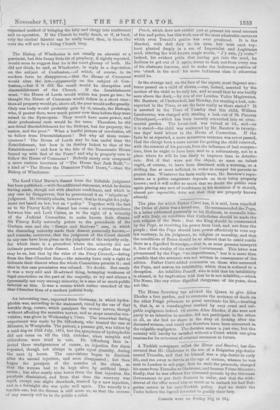The Bishop of Winchester is not usually an alarmist or
a pessimist, but this funny little bit of prophecy, if rightly reported, would seem to suggest that he is the most gloomy of both. He 'did not think, he said, at Winchester, in reply to a deputation on the subject of Confession,—of which, of course, in its inodern form he disapproves,—that the House of Commons would alter the law,--;apparently on the subject of Con- fession,—but if it did, he result would be disruption and disestablishment of the Church. If the Establishment went, " the House of Lords would within ten years go too ; he thought the House of Commons would follow in a short time ; then all property would go, above all, the poor would suffer greatly. 'Only one body would probably gain by it, namely, the Bishops, who, if poorer then, were much poorer now than before they were raised to the Episcopate. They would have more power, and their professional rank would be the same. Therefore, he did sot dread disestablishinent for the Bishops, but for property, the nation, and the poor." What a fearful picture of revolution, all to follow from Disestablishment I But why all these conse- quences? The House of Lords may be less useful than the Establishment, but how is its destiny linked to that of the Establishment ? and how is the fate of the Democratic House bound up with that of the Peers? and why is property sure to follow the House of Commons ? Nobody surely ever composed a more curious inversion of "The House that Jack Built,"— a kind of "The House the Dissenters Pulled Down,"—than the Bishop of Winchester.


































 Previous page
Previous page